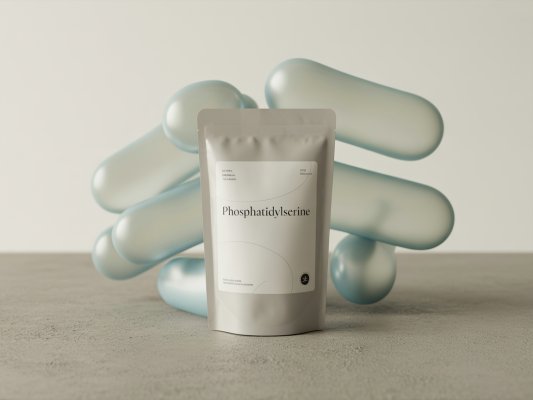
Phosphatidylserine
Description
Phosphatidylserine (PS) is a naturally occurring phospholipid vital for maintaining cellular structure and function, particularly in the brain. It plays a crucial role in cognitive processes, and supplementation is often considered to support memory and mental acuity. This article provides a comprehensive yet accessible overview of PS, covering its benefits, dosage, potential side effects, and more.
Quick Overview: Phosphatidylserine At-a-Glance
- Key Benefit(s): Supports memory, mental acuity, and stress management.
- Primary Mechanism: Maintains cell membrane integrity and modulates neurotransmitter function.
- Best For: Individuals experiencing age-related cognitive decline or those seeking to manage stress.
- Typical Dose Range: 200-400mg daily.
- Key Caution/Consideration: Potential for mild side effects like insomnia or stomach upset at higher doses.
Table of Contents
Categories & Effectiveness
Learn about our rating methodologyBrain Health
Acetylcholine Support
7/10Strong evidence of effectiveness
Neuro-Repair Support
7/10Strong evidence of effectiveness
Synaptic Plasticity
4/10Moderate evidence of effectiveness
Cognition
Memory & Recall
7/10Strong evidence of effectiveness
Mental Acuity
7/10Strong evidence of effectiveness
Concentration & Focus
4/10Moderate evidence of effectiveness
working memory
4/10Moderate evidence of effectiveness
Mood & Stress
Mood Elevation
4/10Moderate evidence of effectiveness
Systemic Health
Anti-Inflammatory (Systemic)
4/10Moderate evidence of effectiveness
Cellular Anti-Aging
4/10Moderate evidence of effectiveness
Cellular Repair
4/10Moderate evidence of effectiveness
Dosage & Side Effects
Recommended Dosage
Potential Side Effects
Bioavailability & Half-Life
Interactions & Stacks
Recommended Products
Doctor's Best, Phosphatidylserin mit SerinAid, 100mg, 120 vegane Kapseln, Laborgeprüft, Glutenfrei, Sojafrei, Vegetarisch
- Rated 4.8 stars by 9 customers
- Premium quality ingredients
As an Amazon Associate we earn from qualifying purchases. Prices and availability are accurate as of the date/time indicated and are subject to change.
Benefits by Use Case
Enhanced Memory
Studies suggest PS can improve memory recall and cognitive function, particularly in older adults experiencing age-related decline. Some studies show benefits fade over time.
stress reduction
PS may help lower cortisol levels, the stress hormone, promoting a sense of calm and well-being. Dosage: 300-400 mg/day.
Improved Athletic Performance
PS can reduce muscle soreness and fatigue after exercise, potentially enhancing recovery and endurance. Dosage: 400-800 mg/day.
ADHD Symptom Management
Some research indicates PS may help reduce hyperactivity and impulsivity in children with ADHD. Often combined with Omega-3 fatty acids.
Mechanism of Action
Frequently Asked Questions
Where to Buy Phosphatidylserine
Based on quality, price, and customer reviews, here are our top recommended Phosphatidylserine supplements:
5-HTP Kapseln | aus Griffonia | Mit Ashwagandha KSM-66® und Rhodiola Rosea Rhodiolife® | Adaptogene Komplex | Laborgeprüft | Ohne Zusatzstoffe | Deutsche Produktion von Vegavero®
- Rated 4.4 stars by 492 customers
- Premium quality ingredients
Phosphatidylserin 300mg Hilft, Cortisol zu Reduzieren, Gedächtnis und Konzentration zu Verbessern, Stress zu Bewältigen, Nootropisches mit den Vitaminen B1, B6, B12 und Folsäure - 60 Kapseln Me Myeasy
- Rated 4.3 stars by 132 customers
- Premium quality ingredients
Phosphatidylserin + Bacopa Monnieri 250mg 90 Vegan Kapseln, Laborgeprüft, Hochdosiert, Nicht GVO
- Rated 4.3 stars by 113 customers
- Special offer: Spare 15 % mit Rabattgutschein
As an Amazon Associate we earn from qualifying purchases. Prices and availability are accurate as of the date/time indicated and are subject to change.
Summary & Expert Opinion
Diving deeper, Phosphatidylserine's mechanism of action involves several complex interactions at the cellular level. As a major anionic phospholipid concentrated in the inner leaflet of neuronal plasma membranes, PS plays a critical role in maintaining membrane integrity and fluidity, essential for proper neuronal function. It also participates in cell signaling pathways, influencing processes such as neurite growth, synaptogenesis, and neuronal survival by activating Akt, PKC, and Raf-1 pathways.
Furthermore, PS's role in apoptosis involves its translocation to the outer leaflet of the cell membrane, acting as an "eat-me" signal for phagocytic cells to clear apoptotic cells, preventing inflammation. This is linked to its potential role in ischemic stroke treatment, where it may influence apoptosis, inflammation, coagulation, and neuronal regeneration.
The biosynthesis of PS is equally complex, involving head-group exchange reactions catalyzed by phosphatidylserine synthases (PSS1 and PSS2) in the endoplasmic reticulum. These enzymes convert phosphatidylethanolamine or phosphatidylcholine into PS, highlighting the intricate metabolic pathways involved in maintaining PS levels in the brain.
While studies suggest cognitive benefits, particularly in elderly individuals with mild cognitive impairment, the results are often inconsistent, potentially due to variations in study design, PS source (bovine vs. soy/sunflower), and individual genetic factors. The FDA's "qualified health claim" for PS and cognitive dysfunction reflects this uncertainty, acknowledging the limited evidence supporting its efficacy.
From a practical standpoint, the shift from bovine-derived PS to plant-derived sources due to concerns about mad cow disease underscores the importance of sourcing and safety considerations. While plant-derived PS is generally considered safe, it's essential to choose reputable brands that undergo rigorous testing to ensure purity and potency.
In conclusion, Phosphatidylserine is a fascinating molecule with a complex interplay of mechanisms and potential benefits. While it may offer cognitive and stress-related support for some individuals, it's crucial to approach supplementation with realistic expectations, prioritize safety, and consult with a healthcare professional for personalized advice. Pro Tip: Pair PS with omega-3 fatty acids for potentially synergistic cognitive benefits.










